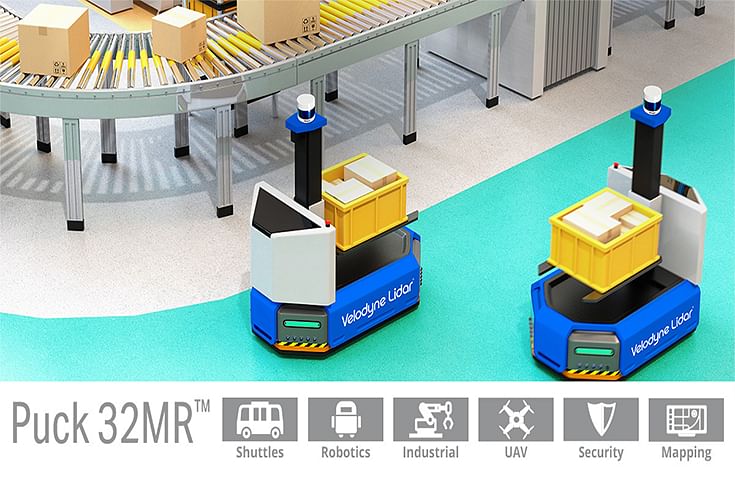Velodyne Lidar introduces new sensor for low speed autonomous markets
Velodyne Lidar’s Puck 32MR sensor is designed for low speed autonomous markets including industrial vehicles, robotics, shuttles and unmanned aerial vehicles (UAVs).
Velodyne Lidar has introduced the ‘Puck 32MR’ sensor targeted at the autonomous industry. This product, the company says, offers a cost-effective perception solution for low-speed autonomous markets including industrial vehicles, robotics, shuttles and unmanned aerial vehicles (UAVs).
In addition to featuring Velodyne’s patented surround-view perception capability, the Puck 32MR boasts a range of 120 metres and a 40-degree vertical field of view to enable navigation in unfamiliar and dynamic settings.
Generating a high-resolution point cloud with minimal noise in all light conditions, it is claimed that the Puck 32MR accurately detects crosswalks, curbs, vehicles, pedestrians, bicycles and obstacles for safe and efficient operation in roadway, commercial and industrial use cases. Along with outstanding perception performance, this sensor delivers reliability and durability in a compact form factor.

Anand Gopalan, chief technology officer, Velodyne Lidar, said, “Velodyne continues to innovate lidar technologies that empower autonomous solutions on a global scale. This product fills a need for an affordable mid-range sensor, which our customers expressed, and we took to heart. We strive to meet our customers’ needs, and the Puck 32MR is another example of our versatility within an evolving industry.”
The Puck 32MR is designed for power efficiency to extend vehicle operating time within broad temperature and environmental ranges without the need for active cooling. The sensor uses proven 905 nanometer (nm), Class 1 eye-safe technology and is assembled in Velodyne’s manufacturing facility.
The Puck 32MR, according to the company, is designed for scalability and priced attractively for volume customers. Velodyne provides technical support for the sensor across North America, Europe and Asia.
Also read: Velodyne partners Nikon to mass produce Lidar sensors
RELATED ARTICLES
Sept 2024 From R&D incentives to EV infrastructure: What auto components industry expects from Budget 2024
Sept 2024 From R&D incentives to EV infrastructure: What auto components industry expects from Budget 2024
US car majors hit the brakes on driverless cars
Ford Motor and Volkswagen to close self-driving startup Argo AI, due to lack of technology and clear regulations.
Autoliv and Geely to develop advanced safety tech for future vehicles
Scope of cooperation includes safety for high-level autonomous driving, intelligent steering wheel technology, a 360deg ...






 By Autocar Pro News Desk
By Autocar Pro News Desk
 12 Aug 2019
12 Aug 2019
 5583 Views
5583 Views









